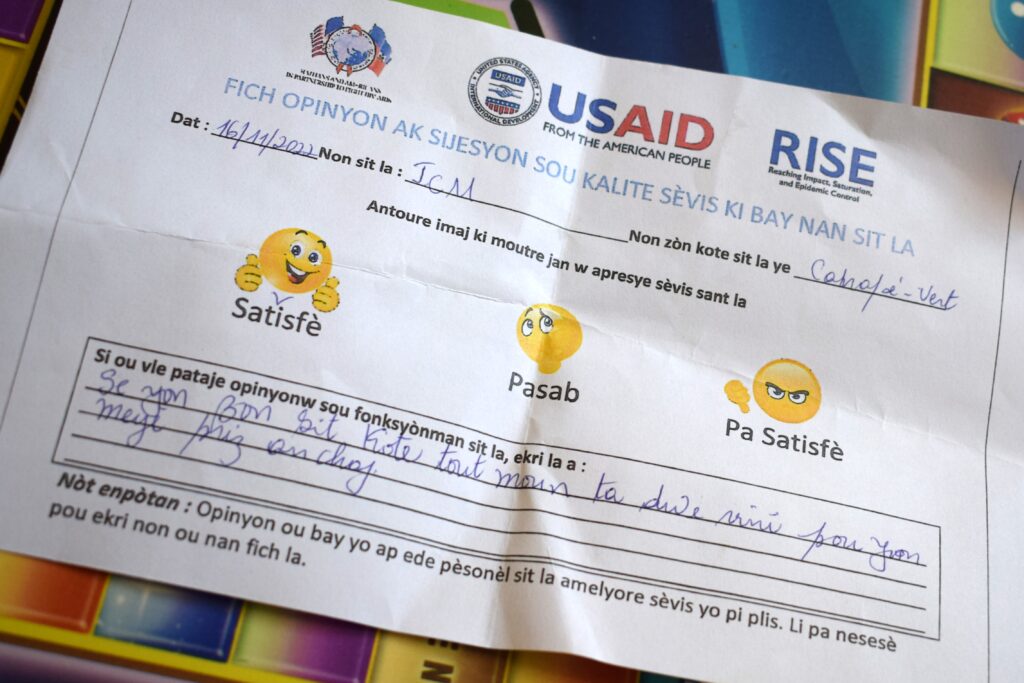Building a More Responsive, Respectful Health System: Haitian Health Facilities Use Suggestion Boxes to Improve HIV Services
Building a More Responsive, Respectful Health System: Haitian Health Facilities Use Suggestion Boxes to Improve HIV Services
By Timothé Chevaux and Sarah Hladik

Across 115 health facilities in Haiti, patients are taking advantage of a new opportunity to improve their quality of care – and all it takes is dropping a form in a suggestion box. Every month, these big, yellow boxes are filled with comments and suggestions from clients, which health facility staff then read and address in a community-wide effort to improve care and services for people living with HIV.
To improve the quality of services, the Ministry of Public Health and Population (Ministère de la Santé Publique et de la Population (MSPP), through the National AIDS Program, has been working to enhance client–provider relationships through a person-centered service delivery approach. The Reaching Impact, Saturation, and Epidemic Control (RISE) Haiti SPOTLIGHT project (RISE Haiti), funded by PEPFAR through USAID, has supported the MSPP to address stigma within healthcare settings. The RISE partnership is led by Jhpiego and implemented in Haiti by Management Sciences for Health (MSH) and Fondation SEROvie.
The project developed the Training Guide for Improving the Client-Provider Relationship in Person-Centered HIV Service Delivery in Health Facilities, which includes recommendations and tools on person-centered HIV care. In addition, the project trains and mentors health providers on compassionate care and practices to help create a respectful atmosphere for service delivery. As a follow-up to the trainings, the RISE mentors also conduct supervisory and coaching visits at the facilities to ensure the concepts are well implemented.
To build on these efforts, the project is helping facilities set up and use suggestion boxes, which give patients an outlet to share their specific concerns and allow facilities to receive unbiased feedback from health service users. RISE Haiti has placed suggestion boxes in 115 project-supported health facilities. All clients, regardless of their literacy ability, can provide anonymous feedback either by marking an image of a happy, neutral, or sad face or leaving written comments. Instructions on how to use the form are provided to clients when they are at the registry station. Each facility has formed a committee of three staff to unlock the box and review the suggestions on a monthly basis. The committee then works together to develop plans to address these concerns, which, in turn, helps improve services and patient satisfaction.
At Fondation pour la Santé Reproductrice et l’Education Familiale (FOSREF) Lakay Delmas 19, a non-profit organization focusing on reproductive health and family planning, the roll out of the suggestion box system in May 2023 helped staff identify three key problems brought forth by clients: long wait times, poor reception of clients, and lack of professional courtesy from some health providers. To address these problems, RISE mentors supported health facility staff to conduct refresher trainings on greeting clients, using material from the customer service module of the training guide, and added additional staff at reception to ensure clients are attended to in a timely manner.
Some FOSREF clients noted experiencing unequal treatment in waiting times compared to other patients. To promote fairness, the clinic instituted a ticket system to serve clients in order of arrival. RISE mentors also helped develop and disseminate flyers to remind staff how to promote and ensure good client/provider communications. Furthermore, actions were taken to address specific client complaints, including issuing warnings to staff or placing them on performance improvement plans as needed, increasing the number of staff in the laboratory to reduce wait times, and installing fans and water coolers in waiting rooms to improve the overall client experience. After only a month of implementing these measures, client responses showed a significant improvement in patient satisfaction, highlighting the impact of the suggestion box and the quality improvement practices being implemented.
While facilities and clinics have been adjusting and revamping their policies and procedures to better meet patient needs, RISE Haiti continues to play an integral role in monitoring and assessing the progress of these interventions. RISE mentors periodically evaluate the sites on their service, suggestion box use, and implementation of their quality improvement action plans. During the last several visits since the boxes have been in place, many of the project-supported facilities’ assessment scores have increased as they improve their facility environment. Moreover, during this time, the number of adults and children who have continued treatment for at least 12 months after starting ART at these project-supported facilities has been steadily improving.
The successes noted at FOSREF Lakay Delmas 19 are a good example of the improvements that can come from a simple, low-cost intervention. From reducing waiting times to ensuring patients are treated with equality and respect, these suggestion boxes have not only helped these project-supported facilities identify client concerns but take action to improve long-held policies and entrenched procedures to better serve patients. With client perspectives now informing these quality improvement processes, patient-centered care at Haiti’s HIV treatment centers is truly becoming a reality.